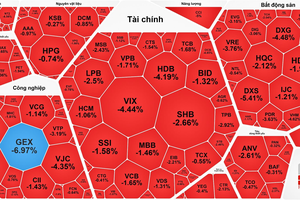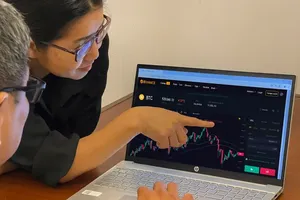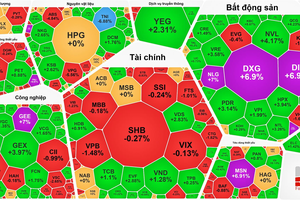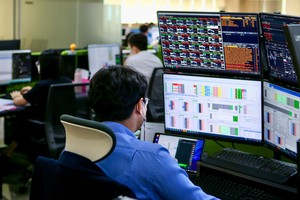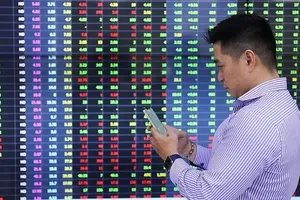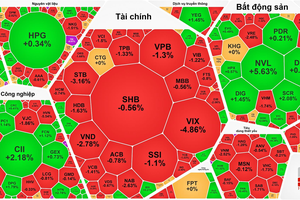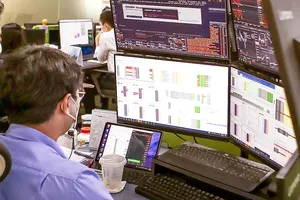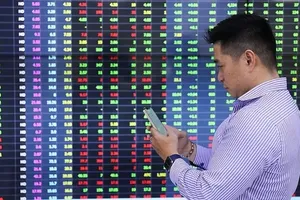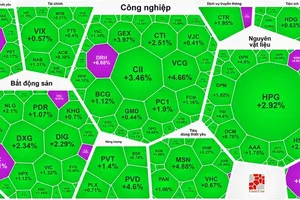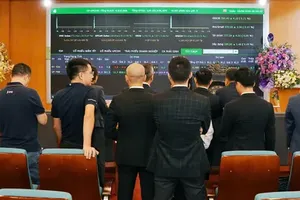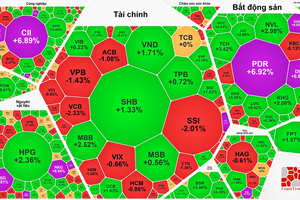 |
Experts anticipate that in the near future, foreign funds will continue to inject capital into the market through investment funds.
The impact of foreign capital
Foreign investors have played a significant role in the recovery of Vietnam's stock market in the first two months of 2023. The Ho Chi Minh City Stock Exchange (HoSE) has reported that the total trading value of foreign investors in January 2023 exceeded VND34.34 trillion, accounting for more than 10.2 percent of the total trading value of the entire market.
It is worth noting that during the last two weeks of February and the first week of March, foreign investors tended to withdraw their capital from the market and heavily sell off shares, leading to a difficult time for the market. When foreign investors resumed net selling in the final days of February with a value of over VND640 billion on the HoSE, the VN-Index dropped by nearly 87 points or 7.78 percent, and the market capitalization of the HoSE also evaporated by approximately VND350 trillion (equivalent to US$15 billion). Despite the market plummeting, it failed to activate bottom-fishing cash flow, with liquidity in many sessions in February dropping below VND6 trillion through the order matching channel - the lowest in more than two years.
One of the reasons for the market's lack of motivation to make a breakthrough was the slowdown of foreign capital inflows. However, the situation completely reversed from the beginning of last week until now when the Vietnamese stock market turned to positive gains, with foreign investors playing a significant role in supporting the market. After three weeks of net selling, totaling more than VND3 trillion, foreign investors returned to disburse, causing the VN-Index to go against the world market by increasing nearly 30 points last week.
The return of cash flow
Since the beginning of the week, foreign investors have been buying continuously, with a net buying value of hundreds of billions of Vietnamese dong per session. This has not only contributed to the index's gains but also increased market liquidity to VND10-12 trillion per session, a 13.4 percent increase from last week.
The rebound of Vietnam's stock market is attributed to a lot of positive information. Besides the news that the Government has just issued Decree No. 08/2023 on the issuance of private corporate bonds, which helps stabilize sentiment and attracts cash flow back to the market, there is also information that trillions of Vietnamese dong from foreign investors will be disbursed in the next 1-2 weeks. Mr. Dinh Quang Hinh, Head of the Macro Department and Market Strategy Analysis Division of VNDirect Securities Company, stated that the recovery of the stock market is also thanks to positive information from foreign capital inflows. Specifically, the approval of increased capital for Fubon ETF and Vietnam's inclusion on China's pilot list to open tourism in groups from March 15 have reinforced positive sentiment in the market.
This week, important news is expected to come from the portfolio restructuring of foreign ETFs (VNM ETF and FTSE ETF), as well as the disbursement of the Fubon ETF after a successful fundraising. Mr. Hinh anticipates that foreign capital inflows will be strong net buyers and be a factor in keeping pace with the market. He estimates that VNM ETF and Fubon ETF can buy a net value of more than VND6 trillion on the Vietnamese stock market in the next few weeks.
The SSI Securities Company's research team has a different view regarding the cash flow from the ETF, stating that it has the characteristics of individual investors. Therefore, predicting net buying or selling will be difficult. This is because Vietnam's economy faced challenges in the first two months of the year, such as slowing external demand and inflationary pressure on domestic consumption. Furthermore, there may be sessions where the market experiences volatility due to concerns about the Federal Reserve's monetary policy tightening in the upcoming meeting. However, despite these challenges, the market's recovery trend remains dominant.
On March 16, the Vietnam stock market saw a strong rebound after receiving news of a reduction in benchmark interest rates from the State Bank of Vietnam. This led to a surge in banking and securities stocks, with many hitting their ceiling prices, including VCI, SSI, HCM, FTS, CTS, VIX, SHS, and VND. Real estate stocks also saw good growth, with DIG and DXG hitting the ceiling, and NVL, PDR, and NLG climbing significantly. Market liquidity was moderate, with a total trading value of nearly VND11.8 trillion on the two official exchanges. Foreign investors net bought for the sixth consecutive session, with a total net buying value on HoSE and HNX of more than VND273 billion. At the end of the session, the VN-Index rose by 22.06 points, or 2.12 percent, to 1,062 points, while the HNX-Index also rallied by 4.46 points, or 2.2 percent, to 207.01 points.

